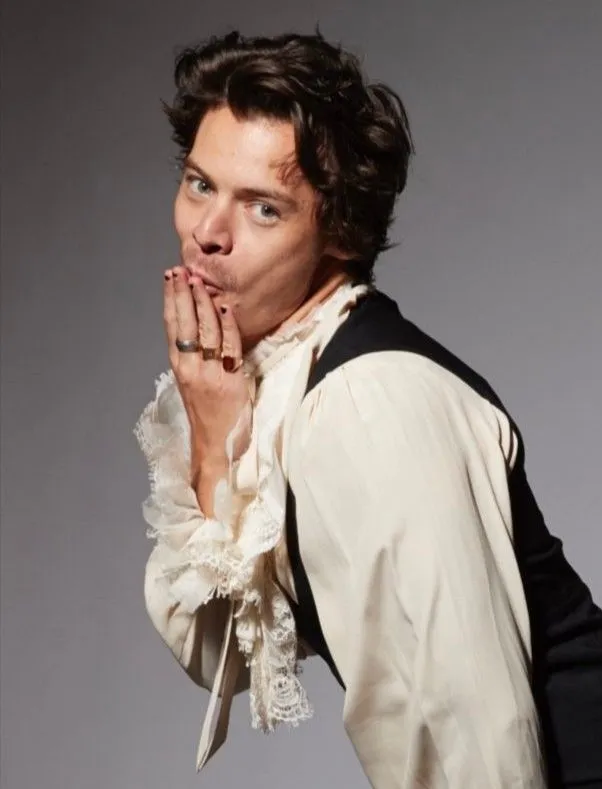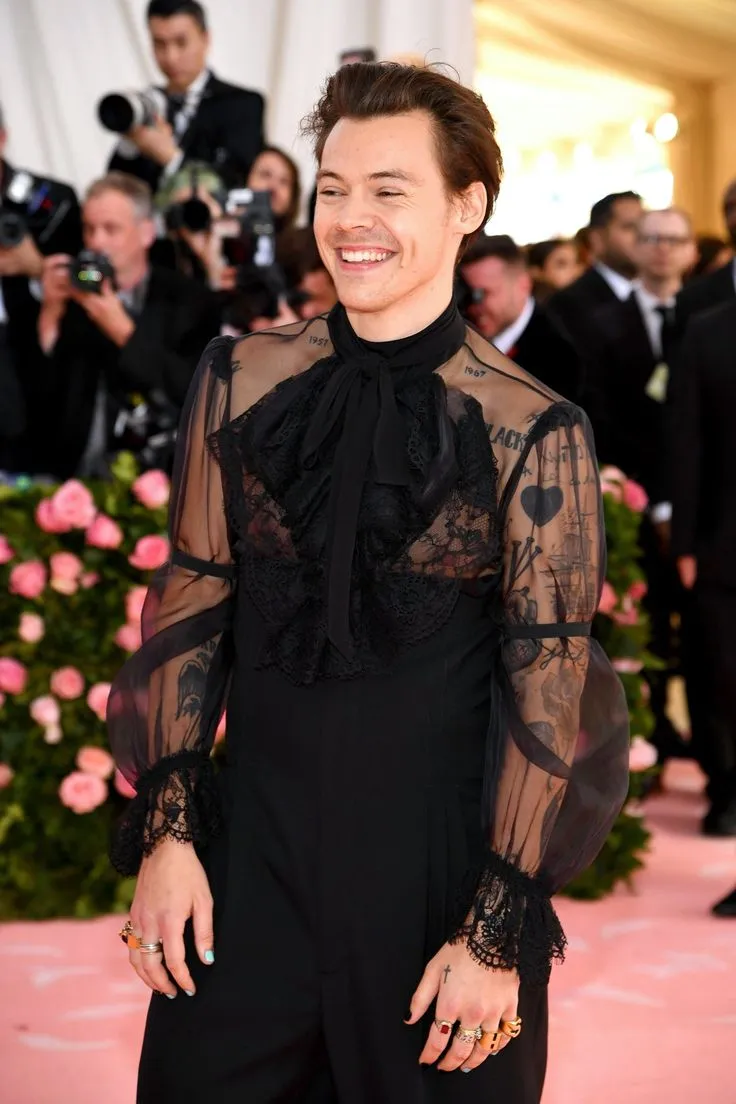

Harry Styles Sends the World into a Frenzy by Calling Teen Girls ‘The Ones in Charge’ – But Do You Know What He Really Meant?
Harry Styles has never been the kind of pop star who avoids difficult conversations. While many celebrities stick to the safety of rehearsed PR lines, Styles often surprises with thoughtful, heartfelt remarks about issues that truly matter. In his recent Rolling Stone interview, he opened up once again – not about chart-topping singles or glamorous romances – but about something that defines him on a deeper level: his belief in women’s intelligence, honesty, and cultural power. What’s shocking to many is not just what he said, but who he credited as some of the most influential voices in today’s culture: teenage girls.
This declaration immediately sparked a storm of reactions online. Fans flooded Twitter and TikTok with clips, debates, and memes, while critics questioned whether Styles was putting himself on a pedestal. But one thing is undeniable: the former One Direction heartthrob has ignited a larger conversation about feminism, fan culture, and the underestimated voices of young women.
The Bold Statement That Shocked Fans
During the interview, Styles emphasized that teen girls “know what they’re talking about” and that their collective cultural influence is unmatched. In his words, these young women are not passive consumers of pop culture but powerful drivers who “own this space” and “are running it.”

For many, this was more than just a compliment. It was an acknowledgment of the often-dismissed demographic that has historically built – and broken – some of the biggest stars in the music industry. From The Beatles to Justin Bieber, teenage girls have been labeled as “obsessive” or “hysterical.” Styles, however, flipped the narrative, reframing their passion as a form of cultural leadership.
This approach resonates strongly with his own fanbase, which is largely female and deeply invested not just in his music but in his message. Yet, while many praised him for highlighting this truth, others argued that the real test lies in how consistently he channels this belief into action.
Growing Up Surrounded by Strong Women
What makes Styles’ comments even more striking is the personal history behind them. Growing up in Cheshire, England, Harry was raised in a family where strong women shaped much of his worldview. His mother, Anne Twist, and his sister, Gemma Styles, have both been public about their influence in his life.
It’s no coincidence, then, that he often credits these early experiences with shaping his respect for women. In multiple past interviews, Styles has referenced how watching his mother navigate challenges made him rethink traditional gender roles. The environment he grew up in did not just make him comfortable with women’s leadership – it normalized it.
For Styles, this background provides a natural foundation for his pro-feminist stance, one that extends beyond mere words. He frequently champions equality both on stage and off, supporting women-led projects, working with female directors for his music videos, and often choosing female openers for his tours.
Harry Styles and Feminism: “It’s Simple”
Perhaps the most disarming part of his Rolling Stone remarks was how straightforward he made the concept of feminism. Styles did not attempt to intellectualize it or drown it in jargon. Instead, he described feminism in its purest form: “men and women should be equal.”
By refusing to complicate the term, Styles removes one of the biggest barriers that often divides public opinion. For him, feminism isn’t a political identity that demands debate but a moral baseline. And in doing so, he challenges both fans and critics to ask themselves: if equality is truly that simple, why does society continue to resist it?
This simplification might be exactly why his message resonates with younger audiences. Teenage fans, many of whom are just beginning to form their social and political identities, find in Styles a voice that validates their beliefs rather than patronizes them.
Why Teenage Girls Matter in Pop Culture
The real headline here is Styles’ unshakable defense of teenage girls as cultural leaders. Critics may scoff, but history repeatedly proves him right. From screaming crowds at Beatles concerts in the 1960s to today’s TikTok trends dominated by Gen Z, it’s clear that young women dictate what becomes cool, popular, and profitable.
When Styles credits teen girls with “running it,” he acknowledges a truth the industry often tries to ignore: that the billions of dollars fueling pop music, streaming, and fashion frequently stem from their loyalty and influence.
Look no further than his own career. From his One Direction days – where millions of girls filled stadiums – to his solo stardom marked by sold-out world tours and award-winning albums, Styles has benefited from the unwavering devotion of young women. Unlike other stars who distance themselves from “fangirl culture” to appear more “serious,” Styles embraces it as a badge of honor.
The Internet Reacts – Praise and Pushback
Unsurprisingly, social media exploded after the Rolling Stone feature. On TikTok, users shared clips praising Styles’ honesty, calling him “one of the few male celebrities who truly respects his fans.” On Twitter, hashtags like #HarryStylesFeminist trended for hours.
But it wasn’t all applause. Some critics accused him of being performative, arguing that praising women in interviews is easy while systemic issues in the music industry remain unchallenged. Others felt he risked sounding patronizing by singling out teen girls instead of including a broader spectrum of women.
Still, the overall sentiment leaned positive. Fans pointed out that Styles’ actions – from advocating for gender-neutral fashion to his hiring practices – reflect his words. Unlike celebrities who treat feminism as a branding tool, Styles has consistently aligned his career choices with his message.
Fashion as Feminism
One of the most overlooked aspects of Styles’ feminist approach is his fashion sense. Known for breaking gender norms with sequins, dresses, and flamboyant suits, he has repeatedly used style as a political statement. His iconic Vogue cover in a dress was not just about aesthetics – it was about redefining masculinity in a way that empowers everyone, not just men.
This ties directly to his remarks on women’s influence. By challenging rigid expectations of what a man should look like, Styles widens the cultural space for women and men alike. For teenage fans watching him proudly embrace vulnerability and fluidity, the message is clear: being yourself is powerful, no matter what anyone says.
Why This Interview Feels Different
Celebrities talk about feminism all the time, but why did Harry Styles’ interview land so differently? The answer may lie in his tone. Instead of making the conversation about himself, he framed it around the women who inspire him. Instead of claiming expertise, he admitted the simplicity of the concept. Instead of dodging teen girls as a fanbase, he celebrated them.

This humility separates him from others in the industry who use feminism as a branding exercise. Fans sense authenticity in Styles – and that authenticity is exactly why his words spread so fast online.
The Bigger Question
As powerful as his comments were, they also leave us with a lingering question: Will Harry Styles’ stance influence other male celebrities to follow suit, or will he remain an exception?
Pop culture has long sidelined female voices, even as it profits from them. For every Styles who celebrates teenage girls as cultural leaders, there are dozens of male stars who dismiss them as “overly emotional” or “irrational.” If Styles’ comments prove anything, it’s that giving credit where it’s due can reshape the conversation – and maybe even the industry.
Final Thoughts
Harry Styles may be best known for his music and magnetic stage presence, but moments like this remind us why he is more than just another celebrity. By praising women’s intelligence, honesty, and influence, he acknowledges what many have overlooked for decades: that women – especially young women – are at the center of cultural power.
His belief that “feminism is simple” challenges us to stop complicating equality and start embracing it as a given. And by refusing to downplay the impact of teenage fans, he restores dignity to a group that has too often been ridiculed.
Whether you love him, hate him, or remain undecided, one truth is clear: Harry Styles has once again started a conversation bigger than himself. And if his words inspire even a fraction of his massive global fanbase to rethink how they view women and equality, then perhaps he has already achieved more than most pop stars ever will.


















